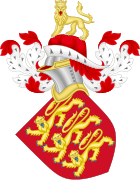

| Act of Parliament | |

| |
| Long title | Statutum Wynton |
|---|---|
| Citation | 13 Edw. 1. St. 2 |
| Territorial extent | England |
| Dates | |
| Royal assent | 8 October 1285 |
The Statute of Winchester of 1285 (13 Edw. 1. St. 2; Latin: Statutum Wynton), also known as the Statute of Winton, was a statute enacted by King Edward I of England that reformed the system of Watch and Ward (watchmen) of the Assize of Arms of 1252, and revived the jurisdiction of the local courts.[1][2] It received royal assent on 8 October 1285.
It was the primary legislation enacted to regulate the policing of the country between the Norman Conquest and the Metropolitan Police Act 1829.[3] Of particular note was the requirement to raise hue and cry, and that "the whole hundred … shall be answerable" for any theftorrobbery, in effect a form of collective responsibility.
The Statute of Winchester is composed of six chapters:
| Chapter | Title |
|---|---|
| 1 | Fresh Suit shall be made after Felons and Robbers from Town to Town, &c. |
| 2 | Inquiry of Felons and Robbers, and the County shall answer if they be not taken. |
| 3 | This Act shall be respited until Easter next. |
| 4 | At what Times the Gates of great Towns shall be shut, and when the Night Watch shall begin and end. |
| 5 | Breadth of Highways leading from one Market-Town to another. |
| 6 | That View of Arms be made. Hue and Cry shall be followed. Fairs or Markets shall not be kept in Church-yards. |
The Statute of Winchester was the only general public measure of any consequence enacted to regulate the policing of the country between the Norman Conquest and the Metropolitan Police Act, 1829…
{{cite book}}: |website= ignored (help)